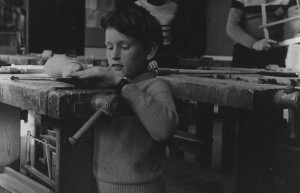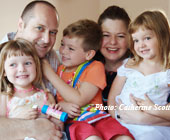
In the traditional family, the child has many supports. First of all, he has the love of his family members. Next, he has the physical, psychological and even moral similarities provided by heredity and last he has the support of tradition – of customs, ways of being and family history. When properly understood, these qualities make the child proud of who he is. It gives him a sense of his value in society as the continuation of a family line.
 In such a family, the child has three distinct levels of public before which he must affirm his individuality. First, he has his immediate family that is most similar to him and among whom he is highly uninhibited. It is the atmosphere where he senses the most love as well. Among this public, he has the least difficulty in affirming those things which make him different from others.
In such a family, the child has three distinct levels of public before which he must affirm his individuality. First, he has his immediate family that is most similar to him and among whom he is highly uninhibited. It is the atmosphere where he senses the most love as well. Among this public, he has the least difficulty in affirming those things which make him different from others.
However, if this were the only public the child had to deal with, he still may not have the courage and self-esteem to affirm his unique qualities before the public at large which is entirely different from him. This is where the second public comes into the play which is the extended family. In the extended family, the child still senses the affection of the family bond, but less than he does amid his immediate family.
He also senses the similarities that exist between himself and his cousins, aunts and uncles and so forth, but there are fewer of these similarities then there are amid his immediate family and more differences. This gives him the ideal “testing grounds,” if you will, where he can practice affirming his own personality and uniqueness with a variety of others, but still in an atmosphere of love, support and similarity.
 In the traditional family, this level is usually quite large and full of life and should be frequented often. This keeps family life from becoming boring and monotonous.
In the traditional family, this level is usually quite large and full of life and should be frequented often. This keeps family life from becoming boring and monotonous.
When these first two levels are strongly in place, first immediate family and afterwards extended family, the child is ready to present himself as an individual before the public at large because he knows he has the support of his parents and siblings, but also that he is largely backed up by this whole society which was the extended family. This will create the best conditions for him to affirm himself in his uniqueness even before a hostile public.


